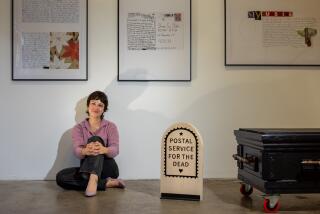Letters Express ‘Friendship . . . and Fear of Nuclear War’ : Woman Who Wrote Gorbachev Hears From Ordinary Russians
- Share via
By now, most Americans have heard of glasnost , Soviet leader Mikhail S. Gorbachev’s policy of openness. But to Nancy Scherberth of La Verne, the word has taken on a new and very personal meaning.
It all started in December, 1987, when Scherberth wrote a letter to Gorbachev, expressing her gratitude for his signing of the Intermediate Nuclear Forces Reduction Treaty.
“My childhood has memories of neighbors building bomb shelters,” Scherberth, 37, wrote to Gorbachev. “My college years were filled with demonstrations against the Vietnam War and now my daughters ask me about nuclear disaster. You have given us hope.”
Scherberth never received a response from the Soviet government, but in July, a letter hand-written in Russian arrived in her mailbox. Upon having it translated, Scherberth learned that her letter had been published in the Soviet Union in a book titled, “Americans Write to Gorbachev.”
More letters followed. So far, 11 Soviet families have written Scherberth, with the most recent letter arriving last Wednesday. The response surprised the La Verne mother of two, who said she has been overwhelmed by the sentiments expressed.
‘So Warm and Caring’
“I’ve cried over some of the letters because they’re so warm and caring,” she said. “They just open themselves up to friendship.”
Scherberth said the book, a copy of which Gorbachev presented to President Reagan during his visit to New York last month, appears to have been widely distributed in the Soviet Union. She has received letters from far-flung regions of the country. Her correspondents include high school students, an engineer, a construction worker and an attorney.
“The common thread through all the letters is warmth and friendship and the common fear of nuclear war,” she said. “They don’t want war any more than we do.”
A typical sentiment was expressed in a letter, written in English, by a journalist living in Moscow.
“What little I know about the American citizens has endeared them to me,” he wrote. “I respect your people and your country sincerely. . . . I believe our correspondence is a spiritual link across the ocean.”
A young couple from Minsk introduced themselves in a letter as “your new friends,” writing in broken English: “We would like to thank you for your . . . (belief that) all Russians are not beasts or monsters.”
Although most of the letters touch on the subjects of world peace and improved relations between the superpowers, the writers seem most interested in learning about the life of an American family.
“They ask things like, ‘What are your hobbies?’ ‘Where do you go on vacation?’ ‘Do you like Bruce Springsteen and Michael Jackson?’ ” Scherberth said. “There’s a lot we have in common, but you don’t ever get to hear that said over here. You don’t realize that people are the same. I love glasnost.”
‘Nonpolitical Person’
Scherberth is quick to stress that her letter to Gorbachev and her correspondence with Soviet citizens do not mean that she is a communist sympathizer or a political crusader.
“I am the most nonpolitical person you’d ever want to meet,” she said. “I go vote, I’m a Republican, but I’m just an average citizen. . . . I’ve never even written my congressman.”
Scherberth said she felt compelled to write Gorbachev because his conciliatory overtures toward Reagan represented “a ray of hope” for world peace.
“I would never have written to (Nikita) Khrushchev, I would never have written to (Leonid) Brezhnev,” she said. “It’s really Gorbachev who inspired me--inspired a lot of people, I think.”
Another writer whose letter was included in the book, Richard Fuller of Danville in Northern California, recently contacted Scherberth to ask if she’d heard from any Soviets. Fuller, who had received four letters, was amazed by the response.
“I was blown away,” Fuller said in a telephone interview. “I felt rejected.”
Touched a Nerve
Fuller suggested that Scherberth’s letter, which avoided specific political issues, touched a nerve with Soviet readers. Fuller’s letter had urged Gorbachev to accept U.S. development of the “Star Wars” missile defense system.
“As I look back on it, I was unhappy that I was so political,” Fuller said. “Nancy’s letter was clearly the least political, the least technical, the least negative (of those in the book). It just said, ‘Let’s be friends.’ Those people really and truly ache for that kind of communication with an American.”
Fuller said he also called a Berkeley psychologist, whose densely worded letter comparing U.S. relations with the Soviet Union and China had also been included in the book. The man told Fuller that he had received no letters from Soviet readers.
“He was really crushed and bummed out,” Fuller said.
By contrast, Scherberth’s letter to the Soviet leader concluded with a neighborly invitation.
“If you do come back to the States and would like to visit an American family, please consider us,” she wrote. “I’ll take you and your family to Disneyland.”
Family Photos
Many of the letters to Scherberth contain detailed descriptions of the writers’ lives, occupations and hometowns. Some of the correspondents have enclosed family photos and drawings by their children. Another proudly sent two large color photo books about his home state, Moldavia.
Scherberth has responded by mailing postcards of Disneyland, and her 13-year-old daughter, Emily, sent a Soviet child a box of candy as a birthday present. One correspondent has asked Scherberth to send a homemade video, but she is wary of the parcel being intercepted by Soviet postal inspectors.
Four families have invited the Scherberths to visit them, and Nancy said she and her husband, Jay, are thinking of taking them up on the offer. Fuller said he is also planning a trip to the Soviet Union.
But for the time being, these Americans will have to continue building their new friendships through the exchange of letters, cards and gifts.
“It’s a big time around here when the mail comes,” Scherberth said. “You kind of wonder if something like this could make a difference if everybody did their part.”
Dec. 14, 1987
Dear General Secretary Gorbachev,
I want to thank you for your visit and your desire to bridge the gap of Soviet and U.S. relations. Your signing of the INF treaty was “a giant leap for mankind.”
I am an average American. My husband and I have two daughters, age 12 and 8. We live in a small community outside Los Angeles.
My childhood has memories of neighbors building bomb shelters. My college years were filled with demonstrations against the Vietnam War and now my daughters ask me about nuclear disaster.
You have given us hope. You have single-handedly changed our country’s view of Russians as warmongers to the realization of your wanting peace as much as we do. We both share the desire to see our grandchildren in a world of peace and security without the black cloud of world destruction hanging over their heads.
You have touched our hearts. You and your lovely wife, Raisa, are welcome guests. Let’s hope a visit of the Reagans to your country can be even more fruitful.
If you do come back to the States and would like to visit an American family, please consider us. I’ll take you and your family to Disneyland.
God bless you.
Nancy Scherberth
La Verne
More to Read
Sign up for Essential California
The most important California stories and recommendations in your inbox every morning.
You may occasionally receive promotional content from the Los Angeles Times.













